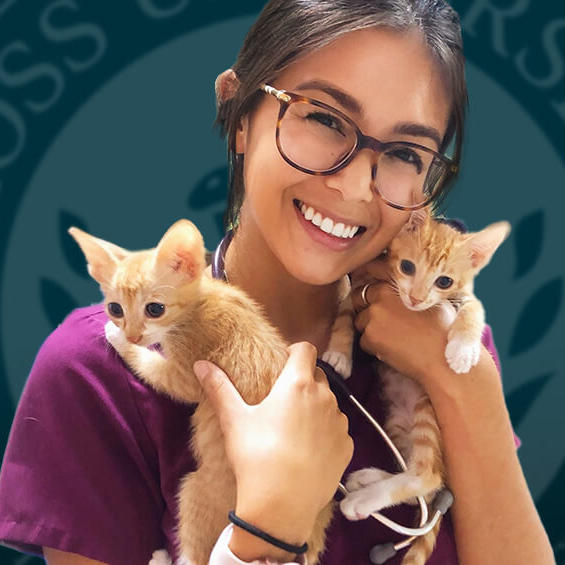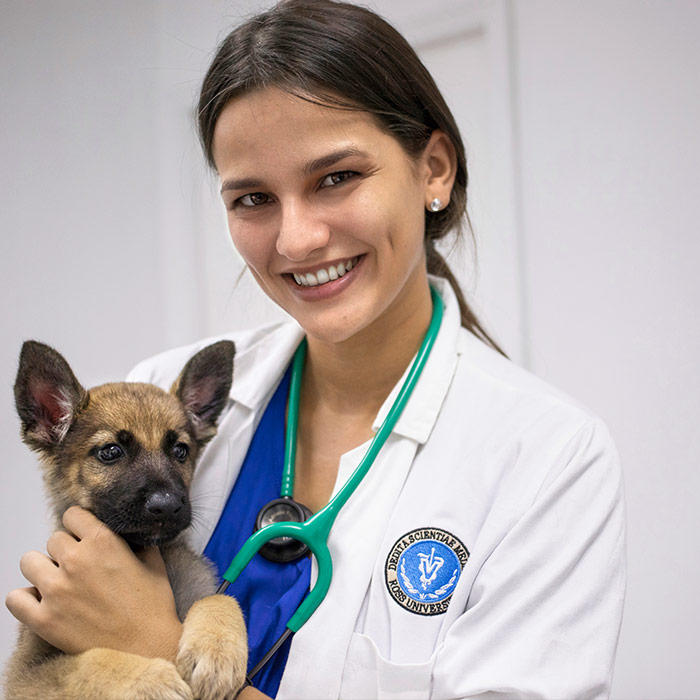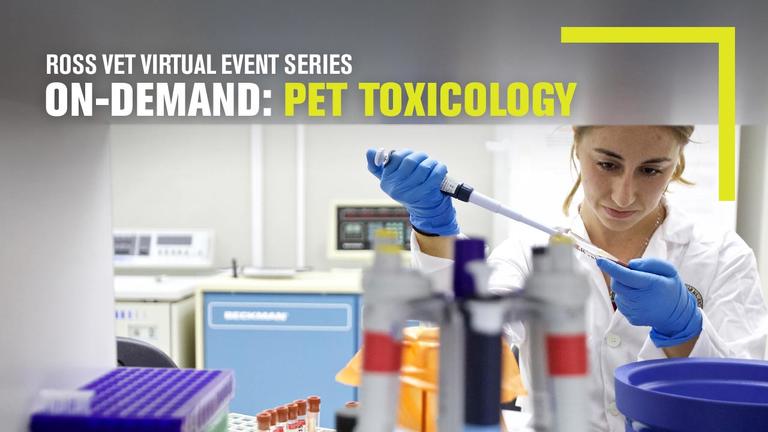CAN YOU GUESS HOW MANY COMMON HOUSEHOLD PLANTS ARE TOXIC TO CATS? OR LIST THE SIGNS OF CHOCOLATE TOXICITY IN DOGS?
Jump start your knowledge of veterinary medicine with a basic introduction to pet poison and toxicity control measures with a virtual workshop hosted by an associate veterinarian for the Pet Poison Helpline, Dr. Michelle Carlino! Watch this on-demand workshop for the opportunity to:
- Test your knowledge of common pet toxins
- Identify the clinical symptoms of toxicity in a variety of companion animals
- Learn about different treatments for the most commonly ingested toxins
- Examine real-life medical cases of toxicity in cats and dogs
- Get a glimpse into the day-to-day life of a veterinarian, including pet poison control
Do you know which of your household plants are toxic to cats? Can you recognize the signs of chocolate toxicity in dogs? It can happen to even the best pet owners. You turn around for one second and the dog has grabbed the chocolate that was sitting on the counter, or the cat has discovered your Valentine’s Day flower bouquet you thought was safely out of the way. As a pet owner, it may be helpful (and potentially lifesaving!) to have a basic knowledge of pet toxicity and pet poison control measures.
Veterinary clinical toxicologists are concerned with the exposure assessment of many animal species to a large variety of potentially toxic chemicals. They may be involved in the investigation of animal deaths associated with toxicant exposure, and often serve as a resource for clients requesting toxicity information to be used in preventive efforts, such as clients concerned about the potential toxicity of a house plant or whether certain foods are safe for their beloved pet.
When you are suspicious of pet poisoning, it’s often a veterinary toxicologist on the other end of the call to answer your questions, assess the situation, and recommend next steps.
COMMON HOUSEHOLD PRODUCTS AND PLANTS
Unfortunately for pet owners, accidental exposure and ingestion of toxic poisons happen every day.
Did you know that many common household items and plants can be quite dangerous for pets?
| Common Food | Common Products | Common Plants |
|---|---|---|
| Grapes/Raisins | Pain Medications/NSAIDS | Hydrangeas |
| Coffee/chocolate | Antidepressants | Lilies |
| Onions/garlic | Laundry/Dishwasher detergent | Oleander |
| Avocado | Ant/Roach bait | Foxglove |
Should ingestion occur, a veterinary toxicologist will begin to manage a course of action for the animal. It’s important to note that not all poisons are deadly. Some just make the animals feel poorly or ill. Almost anything can be toxic or poisonous. It is the dose that determines whether something is safe or dangerous.
The first step is referred to as decontamination, in other words, “to puke or not to puke?”. The toxicologist assesses the situation including the time frame for ingestion, the product involved, determining if charcoal is safe or necessary to give, and next steps for the pet owner.
Assessing for signs or symptoms of potential exposure or ingestion is also a critical piece to problem-solving the course of action taken. Signs of poisoning in pets can range based on the underlying poison. Recognizing potential signs and acting quickly will improve the outcome. Some common signs and symptoms of poisoning generally include:
| Gastrointestinal signs | Internal Bleeding | Kidney Failure | Liver Failure |
|---|---|---|---|
| Vomiting | Pain Medications/NSAIDS | Halitosis (“uremic” breath) | Hydrangeas |
| Diarrhea | Coughing of blood | Inappetence | Hydrangeas |
| Drooling/hyper salivating | Vomiting blood | Vomiting | Jaundice/yellow discoloration to the gums |
| Inappetence | Pale gums | Diarrhea | Weakness or collapse |
| Nausea | A racing heart rate | Excessive thirst or urination | Acting abnormally |
| Weakness or lethargy | Absence or decreased urination | Vomiting | |
| Collapse | Diarrhea | ||
| Black-tarry stool (melena) |
If your pet has potentially gotten into something toxic, don’t go searching around the internet for potentially misleading and harmful information. Instead, there are 2 very credible sources you should contact. The Animal Poison Control Center is operated by the American Society for the Prevention of Cruelty to Animals. Comprised of expert toxicologists and professional veterinarians, it is staffed 24/7 to respond to emergency questions regarding potential poisons. The Pet Poison Hotline is also available 24/7. Services are available throughout the U.S., Canada, and the Caribbean for pet owners and veterinary professionals who may need assistance with treating a potentially poisoned pet. Both services charge a monetary fee.
PET POISON PREVENTION
Accidents happen. Being prepared and early action can help you protect your pet and increases its chance of survival.
- Keep emergency contact information readily accessible including your veterinarian’s phone number and directions to your local 24-hour emergency veterinary hospital.
- Talk to your veterinarian to determine the best plan for you and your pet.
- Prepare a pet first aid kit with any supplies you may need. Both the Animal Poison Control Center and the Pet Poison Hotline offer recommendations for what supplies to include.
- Familiarize yourself with pet poisons and keep them out of reach of your pets. If you believe your pet has ingested a poison, do not wait for signs to develop — seek help immediately.
Simple changes can reduce pet exposure, including vacuuming frequently and keeping potentially harmful substances such as medications in a safe place. Keep all potentially toxic substances, plants, flowers, and foods well out of reach of your pet.
Interested in learning more about Pet Toxicology & Pet Poison Control? Watch Ross Vet’s recent Pet Toxicology and Poison Control webinar with alumna Dr. Michelle Carlino ’14.
See our list of virtual events and livestreams coming soon. Each one is hosted live, so you’ll get the opportunity to have your questions answered by our hosts in real-time. Secure your spot today!
CAREER PATHWAY-VETERINARY TOXICOLOGY
Interested in a career as a Veterinarian who specializes in Toxicology? A strong background knowledge in chemistry and biochemistry, and a knack for problem-solving may be helpful. In addition to earning your veterinary doctor degree, there is usually an additional three years of specialty training. This may include a three-year residency program in Toxicology before passing the American Board of Toxicology (ABT) or American Board of Veterinary Toxicology (ABVT) certification exams.
Pursue your passion for veterinary medicine and toxicology. Learn more about a Doctor of Veterinary Medicine degree today.

Discover the veterinary profession like you never have before. Join Ross Vet alumni, faculty, and colleagues for on-demand webinars that can kick-start your knowledge of veterinary medicine. Explore our learning environments, veterinary specialties, procedures, and case studies before you even become a vet student!

Earning your DVM from Ross University School of Veterinary Medicine offers you much more than a path to animal practice. It unlocks a much larger world of far-reaching career opportunities in veterinary medicine, from companion and exotic animal care, to research that could affect animal and human health on a global scale. From general practitioners to researchers and more, there's a world of possibilities out there to explore.
ABOUT ROSS VET
Ross University School of Veterinary Medicine is accredited by the American Veterinary Medical Association Council on Education (AVMA-COE). Since its founding in 1982, RUSVM has graduated more than 5,000 veterinarians, many practicing in every US state, in Canada and Puerto Rico, and abroad.




